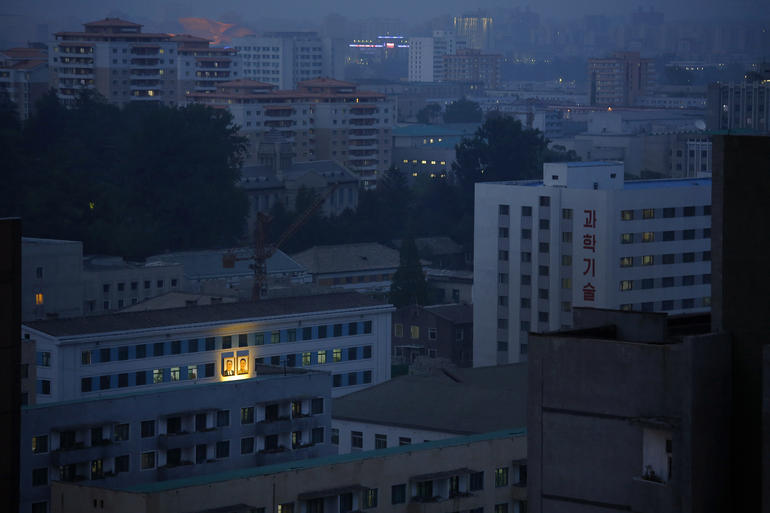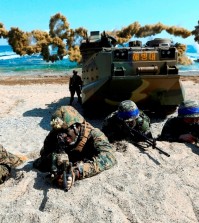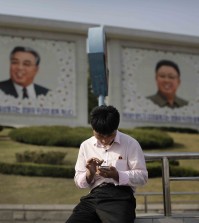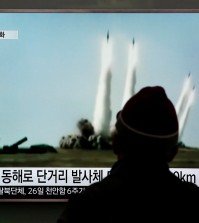- California Assembly OKs highest minimum wage in nation
- S. Korea unveils first graphic cigarette warnings
- US joins with South Korea, Japan in bid to deter North Korea
- LPGA golfer Chun In-gee finally back in action
- S. Korea won’t be top seed in final World Cup qualification round
- US men’s soccer misses 2nd straight Olympics
- US back on track in qualifying with 4-0 win over Guatemala
- High-intensity workout injuries spawn cottage industry
- CDC expands range of Zika mosquitoes into parts of Northeast
- Who knew? ‘The Walking Dead’ is helping families connect
N. Korea’s human rights record “remains among the worst in the world’: US report

Portraits of the late North Korean leaders Kim Il Sung, left, and Kim Jong Il, right, glow on the facade of a building as dusk descends upon Pyongyang, North Korea, May 8, 2015. In Pyongyang, commercial advertisements are rarely seen in public, but portraits of the late leaders and propaganda slogans are a common sight on buildings and along the streets. (AP Photo)
WASHINGTON, June 25 (Yonhap) — North Korea’s human rights record “remained among the worst in the world” last year with public executions, political prison camps, torture and other abuses, the U.S. State Department said in its annual human rights report Thursday.
The Country Reports on Human Rights Practices for 2014 also noted last year’s landmark U.N. Commission of Inquiry (COI) report, saying it concluded the North commits “systematic, widespread, and gross human rights violations” and such violations constitute “crimes against humanity.”
“The human rights record of the Democratic People’s Republic of Korea (DPRK) remained among the worst in the world and came under particular scrutiny this year,” the U.S. rights report said, referring to the North by its official name.
“Defectors continued to report public executions, disappearances, arbitrary arrest and detention, and torture, and there were reports of severe punishment of repatriated refugees,” the report said.
The report said the North’s government continued to subject citizens to “rigid controls over most aspects of their lives, including denial of freedoms of expression, peaceful assembly, association, movement, and religion or belief, while limiting workers’ rights, and denying citizens the ability to change their government.
This year’s report was largely similar to last year’s, except for the COI report.
The landmark U.N. report brought huge international attention to the North’s human rights situation, leading to the U.N. General Assembly adopting a historic resolution calling for referring the issue to the International Criminal Court.
The U.N. Security Council also took up the issue as an official agenda item for the first time.
Pyongyang has long been labeled as one of the worst human rights violators. The communist regime does not tolerate dissent, holds hundreds of thousands of people in political prison camps and keeps tight control over outside information.
But the North has bristled at such criticism, calling it a U.S.-led attempt to topple its regime.
“Now, we understand that some governments may take issue with these reports, including such extreme cases as North Korea or Syria, but also some governments with whom we work closely may also object. But I want to say something about that. I think it’s important,” Secretary of State John Kerry said at a briefing on the report.
“The discomfort that these reports sometimes cause does more to reinforce than to undermine the value and credibility of these reports. Truth cannot successfully be evaded or dented or defeated, not over time. It can’t be changed. The truth wins out,” he said.
On South Korea, the U.S. report expressed concern about Seoul’s interpretation of not only the anti-communist National Security Law, but also “libel laws” in limiting freedom of speech and expression and in restricting access to the Internet.
It also cited “bullying and hazing in the military” as a problem, saying a conscript Army private died from choking and beating at the hands of his superiors and that six soldiers were charged with murder in the case and received sentences of up to 45 years.
















